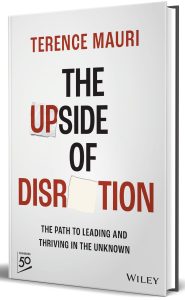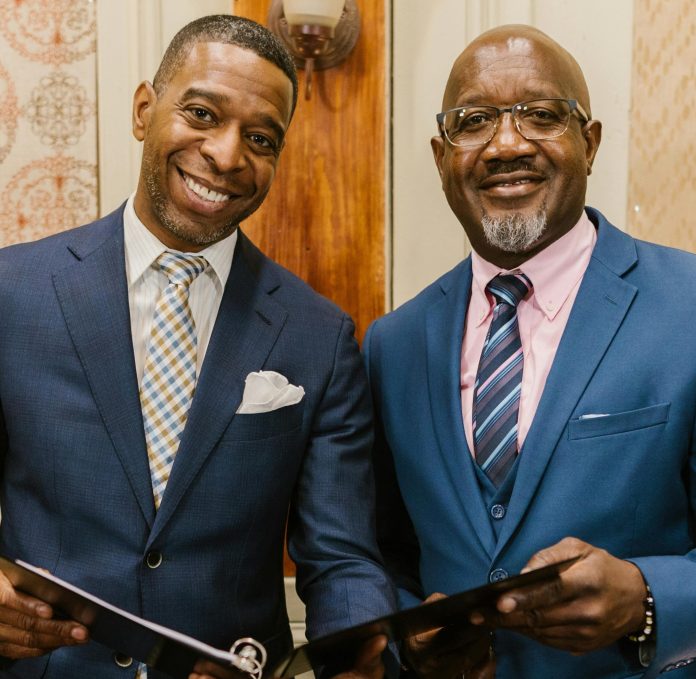 As leaders pivot to remote and hybrid work models, ChatGPT, workforce ecosystems, and talent marketplaces, there is fear and excitement, but is enough being done to unlearn ‘the always-done ways?’ World-leading expert on the future of leadership and Thinkers50 author Terence Mauri, left, argues that as the world evolves faster, there’s a lot we need to learn.
As leaders pivot to remote and hybrid work models, ChatGPT, workforce ecosystems, and talent marketplaces, there is fear and excitement, but is enough being done to unlearn ‘the always-done ways?’ World-leading expert on the future of leadership and Thinkers50 author Terence Mauri, left, argues that as the world evolves faster, there’s a lot we need to learn.
When was the last time you tried to unlearn something? In a recent fireside chat with Professor Amy Edmondson, the author of ‘The Right Side of Wrong: The Science of Failing Well,’ we discussed why good leaders learn from mistakes, but the best leaders unlearn as well, whether it’s outdated ways of working or taken-for-granted assumptions about leadership, or the future.
As a self-taught tennis player, I have experienced the personal challenge of unlearning how to serve a tennis ball. This was trickier than I expected, as I had to let go of the familiar and step into the unknown again. It required humility to recognise that I had terrible habits when served and the vulnerability to speak to a coach to get help. When we watch professional tennis players compete, or any elite sports player, we think of their game as fully formed, but a player’s game requires deliberate and focused learning, which I define as the capacity to reflect (Humility), rethink (Agility), and renew (Growth).
Unlearning could be the highest form of learning in a post-AI world, from eliminating lousy meetings and bureaucratic misery to improving Manager 1:1’s. It’s the ultimate insurance policy against Zombie Leadership (dead leadership that fails to adapt to changing circumstances) and ‘enshittification’ – a term coined by academic Cory Doctorow to describe the slow decay in everything we do. It is at the heart of every future-focused organization, allowing leaders to focus on accelerated growth and rethink outdated mindsets.
What is Unlearning?
At its core, unlearning is a leadership activity that helps us move from reactive to proactive resilience; leaders update their assumptions and behaviors to make space for new learning and keep pace with change. We can’t put more into an empty cup. Unlearning ensures that busy, distracted leaders can overcome FOBO – Fear of Becoming Obsolete, stemming from blind spots such as narrow ambition (thinking too small), fragmented alignment (lack of unity), or execution certainty (lack of focus and commitment). Unlearning for leaders is a skill set but also a mindset for leaning into the discomfort of change and being willing to think and act differently to lead from the future, not the past.
Unlearning is not a quick fix for the dire state of leadership, and there is no one-size-fits-all strategy to prepare for the future of work; however, leaders should consider several unlearning themes to strengthen their future readiness muscle. The old leadership paradigms are eroding, and it’s up to leaders to adapt, too.
If leaders consider ‘the one thing they should unlearn today to help their organizations be future prepared,’ where should you start?
If leaders consider ‘the one thing they should unlearn today to help their organizations be future prepared,’ where should you start? With economic headwinds and tech disruption an everyday reality, the best solution is to activate a culture of curiosity that empowers talent to solve the biggest problems in the organization, calling out blind spots that leaders are blind to and making trust leaps into the future.
One of the clearest signs of unlearning is reframing and rethinking your assumptions about what stays, changes, and goes. For example, firms from Netflix to Microsoft are known for their cultures of curiosity. A culture of curiosity welcomes dissent and is defined as a way of leading that inspires workers to challenge the status quo and unlearn the always-done ways that have gone off, like yogurt in the fridge. It’s the gap between what you know and want to know.
On the other hand, a culture of conformity is a priority for unlearning and is defined as a way of leading that deters workers from challenging the status quo. It’s silence over speaking up and control over trust. It demands deference. As workforce turnover continues to surge and organizations struggle to retain talent, a key takeaway is that you can’t have cultures of curiosity without deliberate unlearning. Without unlearning, expertise and assumptions quickly become obsolete, especially as competitive advantage fades faster.
Six things to unlearn
Many leaders are also trapped in ‘structural stupidity’ based on six barriers to execution that can be reframed as examples of what to unlearn intentionally across the business.
- Silo/lack of cross-functional collaboration
- Slow decision making
- Lack of strategic clarity
- Rigid policies
- Formal hierarchies
- Bureaucratic bloat
For example, the number of words in the US Tax Code has increased from 400,000 to 4 million in the last 20 years, highlighting a human bias toward bureaucratic bloat and adding complexity to complexity. No wonder, according to Hack Future Lab, 93% of leaders need help to focus on what matters, and 63% agree they spend too much time on shallow leadership (low value/low impact) at the expense of deep leadership (high value/high impact). 93% of leaders need help to focus on what matters, and 63% agree they spend too much time on shallow leadership (low value/low impact) at the expense of deep leadership (high value/high impact).
I hear that success breeds success, but success can corrupt success, too. Without intentional unlearning, it’s challenging to stay ahead of change. Worse, leaders get trapped in their optimism bubbles, and to paraphrase the late psychologist Daniel Kahneman, ‘we become blind to our blindness’ and, in particular, change blindness. Hack Future Lab’s research shows that leaders who are empowered to unlearn and share stories of unlearning are significantly better at embracing humility to their blind spots and biases, spotting risks before they become emergencies, and seizing new paths to growth. Remember, good leaders learn, but the best leaders unlearn.
Terence Mauri is a world-leading expert and speaker on the future of leadership, artificial intelligence, and disruption. He is leading a movement for leaders to discuss turning disruption into a tailwind for rethinking leadership for a post-AI world. His new book, published in collaboration with Thinkers50 and Wiley, The Upside of Disruption: The Path of Leading and Thriving in the Unknown, is out now.
is a world-leading expert and speaker on the future of leadership, artificial intelligence, and disruption. He is leading a movement for leaders to discuss turning disruption into a tailwind for rethinking leadership for a post-AI world. His new book, published in collaboration with Thinkers50 and Wiley, The Upside of Disruption: The Path of Leading and Thriving in the Unknown, is out now.


